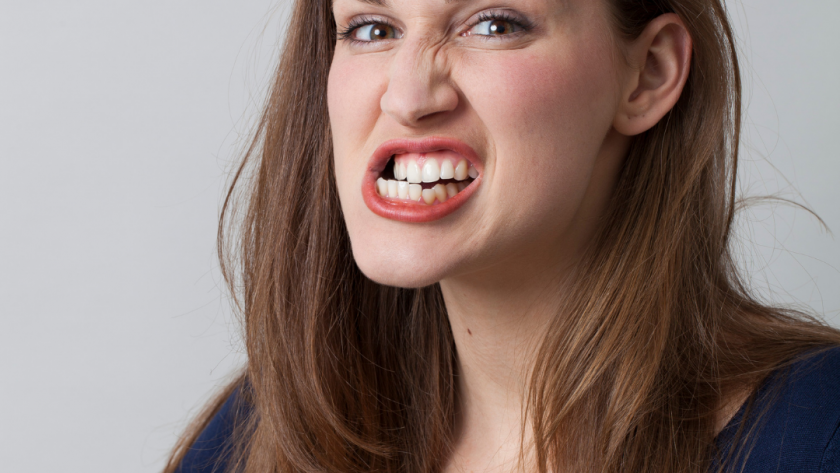Grinding of the teeth, medically referred to as Bruxism, is a common issue for both children and adults. People commonly experience teeth grinding at night, during sleep (sleep or nocturnal bruxism), and are usually not aware. While awake, you can also subconsciously grind your teeth (awake or daytime bruxism). Grinding of the teeth can cause jaw pain, wearing of the tooth enamel, teeth sensitivity, and temporal mandibular disorder (TMD).
Signs and symptoms
- Cracked and worn teeth
- Headaches and facial pain
- Locking or dislocation of the jaw
- Wearing away the tooth enamel and exposing the dentin
- Teeth sensitivity
- Clicking in the temporomandibular joint (TMJ)
- Indentation of the tongue
- Tired jaw muscles
- Loss of teeth
- Pain while eating
Causes of teeth grinding
- Stress: stress is the most common cause of both nocturnal bruxism and daytime bruxism. Clenching is known to be a normal human response to significant stress, people who have very stressful occupations such as law enforcement, military, and healthcare personnel, and who are more susceptible to stress are at risk of frequent clenching and grinding that causes headaches, toothaches, and enamel erosion.
- Misaligned bite: misaligned, missing, or crooked teeth can lead to clenching and grinding of the teeth while awake.
- Excessive caffeine or alcohol use: excessive intake or consumption of a significant amount of caffeine (present in coffee, chocolate, and sodas) and alcohol can lead to grinding of the teeth during the day.
- Heredity: teeth grinding has been found to be a hereditary problem.
- Smoking: smoking of tobacco or use of marijuana can increase the risk of teeth grinding during the day.
How to stop teeth grinding
- Use nighttime mouth guard: using a mouth guard while sleeping will help protect the teeth. A custom-made guard which would be fit by a dentist or one size fits all may be used. The consistent wearing of the mouth guard overnight helps combat sleep bruxism.
- Reduce your level of stress: stress is known to be the most common cause of daytime teeth grinding, reducing the level of your stress will help prevent or reduce teeth grinding. Stress levels can be reduced by:
- Meditation
- Deep breathing
- Exercise and yoga
- Acupuncture
- Orthodontic treatment: teeth grinding because of misalignment or crooked teeth may be corrected by orthodontic treatment. Consult a dentist or orthodontist about orthodontic treatment and its effect on bruxism.
- Stop chewing on things: avoid chewing on things but food. Gums, ice, and chewing on things (pen caps) should be stopped.
- Avoid or reduce chewy foods: foods that required lots of chewing (steak, popcorn, and taffy) will further wear out the jaw. They should be avoided or reduced.
- Caffeine and alcohol consumption: the intake of caffeine and alcohol should be reduced or avoided.
- Become more conscious of your clenching.
- Massage your jaw muscles if you feel your jaw clenching when you are under stress.
Treatment of teeth grinding is dependent on the severity. In a case where the above-listed remedies aren’t effective enough, it is advised to visit a dentist Narre Warren for the best treatment.



